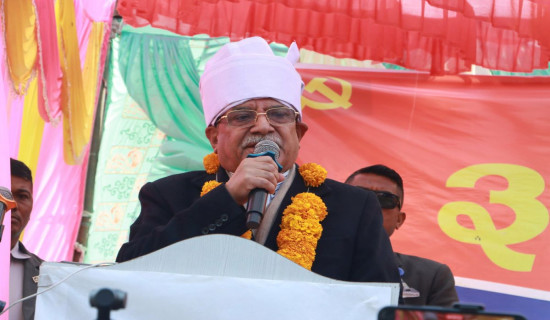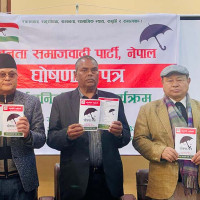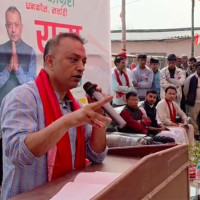- Saturday, 14 February 2026
Bolstering Federal Health System
Across South Asia, the federal health system is intensifying at large. It is the core responsibility of the state to ensure access to quality health services for all citizens based on the contextual norms of the federal system. Following the national health policy 2019, there are some efforts to strengthen a resilient health system for all citizens in the federal structure based on social justice and good governance. Above all, the first and foremost priority is to ensure equitable access to quality health services.
In recent years, there have been increasing debates on the impacts of federalism in Nepal. For instance, delivering basic health care, among others, is a prime responsibility of local government in the federal context. While the implementation of policies and strategies demands an accountable and inclusive health system, the institutional capacity of local governments is unfortunately insufficient. Local health plans are largely conventional, lacking community participation, inclusion and evidence-informed strategic actions. As a result, these efforts have grossly failed to meet the unmet health care needs of many social groups, such as indigenous, elderly, migrant, disabled, people living with HIV/TB, and sexual and gender minorities.
Limited human resources
More importantly, socially excluded groups continue to face a range of challenges in accessing basic health care for several reasons. In the remote areas, limited human resources for health, followed by poor health infrastructure, constrain the ability of local governments in delivering basic health care services. Schemes such as cash transfer and health insurance suffer from serious glitches. In addition, a range of socio-economic, cultural, geographical and political barriers are historically embedded that broadly limit people’s access to essential health care services. Consequently, this leads to deepened poverty, vulnerability and health disparities.
Although critical questions about the relevance and effectiveness of the federal health system have garnered significant scholarly attention over the years, there is limited interdisciplinary analysis on bottlenecks related to the implementation status of the federal health system. Such a lack of attention is attributable, in part, to the political and bureaucratic barriers as the notion of structural reform in the federal context has raised complex and contested issues. In this regard, policymakers and planners have little attention, research and desire for solutions. This attitude limits bureaucratic efficiencies, shaping the future of the federal health system at large.
Within and across three tiers of governments, there are strong criticisms of a lack of clear roles, responsibilities, coordination and accountability mechanisms in the federal health system. If this is a genuine concern, it is high time to rethink the future of the federal health system by foregrounding inclusive health governance as a key analytic for understanding the socio-political dynamics and cultural realities. In the changed socio-political context, it is too early to assess the wider impacts of federalism in health.
However, it is important to explore more on how the federal health system has evolved and what future it envisions. A central question is: In what ways does the federal health system ensure inclusion, equity, diversity and social protection in health care delivery at all levels? By bringing together political leaders, policy makers, planners, health workers and interdisciplinary scholars to grapple with these questions, it will help open new conceptual and political horizons for advancing the federal health system.
Some scholars and practitioners of public health are still advocating for inclusive health governance as a useful strategy to historicise and situate the emerging need for transitioning the federal health system. Moreover, this strategy seeks to promote pro-poor health polices and ensure effective representation and engagement of socially marginalised communities. Health in all polices is a new agenda for advancing multi-sector engagement, but the inter-sectoral coordination mechanism is not effectively functional at all levels.
A comprehensive dialogue that entails the meaningful engagement of key stakeholders within health and beyond is absolutely needed to revisit the federal health system and its implementation approaches, which are historically and culturally rooted in the local context. In the spirit of the federal health system, it is necessary to deepen the synthesis of experiences and learning from the past and take progressive actions to bridge the gap between policy and practice.
Additionally, the health system is deeply linked to local, regional and global histories that eventually shape the emerging priorities of health governance. It is a timely opportunity to critically examine how the federal health system is reshaped amid political instability, growing demographic shifts, the COVID-19 pandemic and a shrinking financing landscape. Of course, our focus must be on achieving universal health coverage and health-related targets of Sustainable Development Goals (SDGs) by charting a clear roadmap to reduce health disparities within and across social groups.
Need for partnership
Considering the evolving politics of the federal health system, we must examine how state and non-state sectors efficiently respond to the growing demands of health care that shape the pathways, patterns and conditions of achieving universal health care. Unfortunately, health for all is only a political slogan as no concrete plans are in place for proactive coordination and partnerships within the health sector and beyond. In the federal context, we need to demonstrate new and distinctive progress leading to better health outcomes across populations.
More worryingly, the health care needs of poor and socially marginalised communities are not effectively addressed yet. This raises an important issue of inclusion, equity and social justice. Nonetheless, in the worldview of people, the social costs of illness and health care are potentially large and cannot be overlooked. And there remains much work to be done to ensure health for all.
(Bhandari is a health policy analyst interested in anthropology.)















